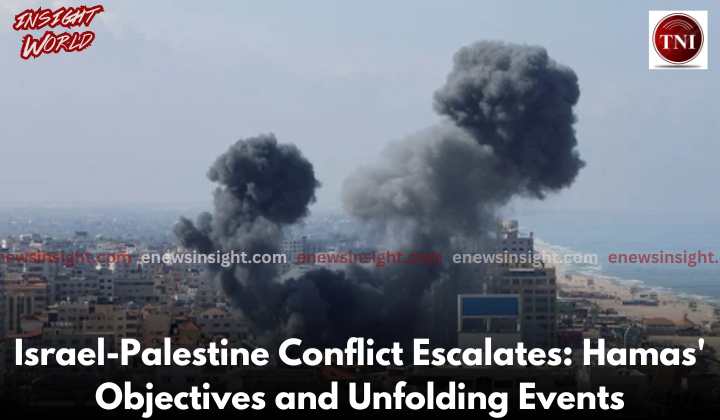Tel-Aviv, TNI Bureau: In an unprecedented and large-scale operation, Hamas, an acronym for the Islamic Resistance Movement, launched a barrage of over 5,000 rockets at Israel from the Gaza Strip while its militants simultaneously infiltrated Israeli territory by land, air, and sea. The attacks resulted in hundreds of casualties and left over a hundred prisoners in the hands of Hamas, potentially to be used in future negotiations for Palestinian prisoners held by Israel. In retaliation, the Israeli Defense Forces (IDF) responded with a series of airstrikes targeting Hamas settlements in Gaza, triggering a night of intense conflict in both Gaza and Israel.
What is Hamas?
Hamas is a Palestinian militant organization that has been in control of the Gaza Strip since 2007. It was founded in 1987 as a response to Israeli occupation of the West Bank and Gaza Strip. Hamas gained power through parliamentary elections but faced international isolation due to its refusal to renounce violence, recognize Israel, or adhere to previous agreements between Israel and Palestine.
Hamas has been recognized as a terrorist group by Israel, the United States, the European Union, the United Kingdom, and several other world powers. Its rule in Gaza and its ongoing conflict with Israel have led to a protracted and complex situation in the region.
What Does Hamas Want?
Support Independent Journalism? Keep us live.
Hamas’s primary objective is the destruction of Israel, which is why it refuses to recognize the state and calls for an end to the “Israeli occupation.” The recent attack was framed as a defense of the Al-Aqsa Mosque in Jerusalem, a longstanding flashpoint in the Israeli-Palestinian conflict. Hamas’s military commander, Muhammad Deif, stated that the rocket strikes were in retaliation for what they perceived as Israel’s desecration of the mosque.
The recent Hamas attacks on Israel have had significant repercussions, not only in terms of lives lost but also in economic terms. Stock markets in Israel and the Middle East saw a sharp decline, setting the stage for potential instability in the region. Israel’s main TA-35 stock index experienced a substantial 5.2 percent decline, its most significant loss in years. Other regional indices also suffered losses, highlighting the broader implications of the conflict.
The Israeli-Palestinian conflict has deep historical roots, dating back to the early 20th century. The international community’s attempt to establish a Jewish homeland in Palestine led to tensions between Jewish and Arab communities. In 1948, Israel declared its independence, leading to a war with neighboring Arab countries and the displacement of hundreds of thousands of Palestinians.
The conflict between Israel and Palestine has seen multiple skirmishes and uprisings over the years, with both sides experiencing periods of violence and attempts at peace negotiations. Hamas, founded in 1987, has played a significant role in the conflict, with its military capabilities and involvement in Palestinian uprisings (intifadas).
As the conflict intensifies, Hamas has called on fighters in the West Bank and across the Arab and Islamic world to join the battle against Israel. Tensions remain high in East Jerusalem, Gaza, and the West Bank. The situation continues to evolve rapidly, with international leaders expressing concerns and calls for de-escalation.
In the midst of this crisis, disturbing visuals have emerged of Hamas fighters parading a naked and battered woman’s body through the streets of Israel. These distressing images highlight the brutality and gravity of the current situation.
The Israel-Palestine conflict has entered a dangerous phase, with Hamas launching a massive rocket barrage and infiltrating Israeli territory. The conflict’s historical context, ongoing tensions, and economic consequences underscore the complexity and urgency of resolving this enduring and deeply rooted conflict. International efforts to broker peace and de-escalation remain vital as the region faces a precarious future.


Comments are closed.